 The coronavirus pandemic gripping the globe may have its origins in China, but experts say that current trends indicate the crisis will leave it in a much stronger position geopolitically relative to the United States, reports suggest.
The coronavirus pandemic gripping the globe may have its origins in China, but experts say that current trends indicate the crisis will leave it in a much stronger position geopolitically relative to the United States, reports suggest.
“The Chinese are in a much stronger position than they have been coming out of any recent global crisis,” Ian Bremmer, president and founder of the Eurasia Group, told MarketWatch.
“They own most of the global medical supply chain. They’ve basically contained the virus through technology-powered, authoritarian surveillance, and they’ve leveraged this success by providing aid to Europe and emerging markets,” in the fight against COVID-19.
Crises such as the Coronavirus’ pandemic “pose particular challenges to the effective exercise and protection of human rights, and put the functioning of our democracies to the test,” said the EU High Representative Josep Borrell. “This is an opportunity for Europe to stand up for its values and interests,” he added, speaking at the launch of the European Commission’s new Action Plan on human rights and democracy.
But while the voices of authoritarian states are strong; the voices of democratic leaders are weak and cacophonous, says analyst Paul Mason.
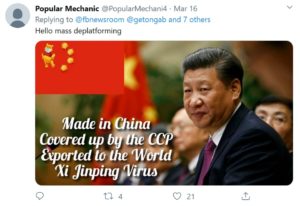
Wikipedia
If China’s containment policy – which could only have been enacted by an authoritarian state – actually works, while … a million Americans die for the sake of a stock market valuation, millions of people across the world will draw political conclusions, he writes for The New Statesman. They will see that “the West” as a concept is disintegrating, and that highly commercialised and atomised democratic societies cannot even protect themselves against a bat virus, let alone benignly administrate the global order.
The world has never before confronted a crisis quite like COVID-19, one that has simultaneously tested both the limits of public health systems everywhere and the ability of countries to work together on a shared challenge, says the Harvard Kennedy School’s Nicholas Burns, former U.S. Undersecretary of State for Political Affairs from 2005 to 2008 and former U.S. Ambassador to NATO from 2001 to 2005.
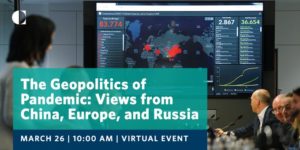 But it is in just such moments of crisis that, under all prior U.S. presidents since World War II, the institutions of U.S. foreign policy mobilize for leadership. They call nations to action. They set the agenda for what needs to be done. They chart a path beyond the point of crisis, he writes for Foreign Affairs, suggesting the formation of a G-20 leaders steering group to focus on the health and economic challenges ahead:
But it is in just such moments of crisis that, under all prior U.S. presidents since World War II, the institutions of U.S. foreign policy mobilize for leadership. They call nations to action. They set the agenda for what needs to be done. They chart a path beyond the point of crisis, he writes for Foreign Affairs, suggesting the formation of a G-20 leaders steering group to focus on the health and economic challenges ahead:
It is also not too early for leaders to assign a group of eminent global public health experts to determine what has gone right so far, what needs to be urgently fixed, which international institutions are failing, and what (if any) new ones may need to be created. Leaders need to demand that governments be better prepared, individually and collectively, for the next crisis.
As with humanitarian crises driven by active conflict, governments and international agencies responding to the pandemic should aim to alleviate human suffering and help people rebuild their lives, adds Paul M. Bisca. a Conflict & Security Consultant for the World Bank.
Inevitably, the success or failure of their efforts will feed into the ongoing public debates about which societal models are better suited to the 21st century: Western liberal democracies or authoritarian regimes such as China and Russia? he writes for Brookings:
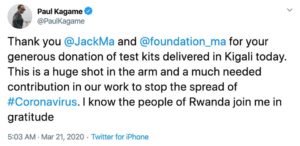 As draconian quarantine measures and rigorous testing drastically reduced the severity of the epidemic in Wuhan, China was quick to lend a helping hand to Italy. As the EU struggled to mobilize assistance, Beijing dispatched medical experts and 31 tons of emergency medical supplies to Rome. This gesture is both an expression of solidarity and a projection of soft power. It mirrors the strategy at the heart of the Belt and Road Initiative, which fills a gap in global infrastructure financing, but also asserts China’s growing clout on the world stage.
As draconian quarantine measures and rigorous testing drastically reduced the severity of the epidemic in Wuhan, China was quick to lend a helping hand to Italy. As the EU struggled to mobilize assistance, Beijing dispatched medical experts and 31 tons of emergency medical supplies to Rome. This gesture is both an expression of solidarity and a projection of soft power. It mirrors the strategy at the heart of the Belt and Road Initiative, which fills a gap in global infrastructure financing, but also asserts China’s growing clout on the world stage.
Some foreign policy experts have embraced the idea that the United States is in a “clash of systems” competition against autocracies, in which patterns of amity and enmity break along regime type, notes Dr. Mira Rapp-Hooper, Schwarzman Senior Fellow for Asia Studies at the Council on Foreign Relations and the author of Shields of the Republic: Triumph and Peril in America’s Alliances. But COVID-19 is a threat that knows no ideology, she writes for War On The Rocks:
In highly varied country-level responses, the pandemic has revealed the fundamental importance of good governance no matter the regime type. Democratic Italy has floundered, while democratic South Korea, Taiwan, and mixed-regime Singapore have displayed some of the most capable responses. The United States will need to prepare for the next such threat with these models in mind, and ought to make the promotion of good international governance a central objective of its foreign policy. In so doing, it should be willing to work with non-democracies — including China — to promote it for the sake of international security and prosperity.
But other observers will question how realistic it is to collaborate with China when……

National Endowment for Democracy (NED)
Beijing is aggressively engaged in a propaganda campaign to characterize its response to COVID-19 as decisive and representative of a superior system, while calling the response of Western democracies like the United States “sloppy,” as John Lee, a Senior Fellow at the Hudson Institute observes.
Propaganda should not be dismissed as mere mischief-making or an annoyance. Beijing is highly adept at controlling narratives to advance its strategic objectives and will use the pandemic to advance the narrative that its authoritarian institutions and practices are superior and lead to better moral and practical outcomes, he writes in a Policy Memo on Combating China’s COVID-Propaganda Offensive to Undermine the United States on the Global Stage:
The CCP will prevail in this propaganda campaign only if the United States refuses to recognize that there is a competition over the narrative accompanying COVID-19 and its impacts or that competing might offend or provoke its opponent. The CCP will also prevail if the United States
continues to downplay its strengths while ignoring its rival’s weaknesses or if a growing number of Americans lose confidence and nerve.

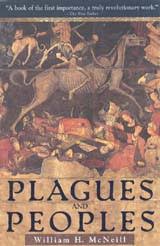 In 1977 the distinguished historian William McNeill published a book entitled
In 1977 the distinguished historian William McNeill published a book entitled 
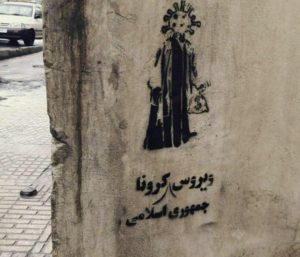 With everything tidied up both at home and abroad, Beijing is deploying its massive propaganda and disinformation apparatus with the aim of making everyone forget that it was in the centre of China that the virus first got out of control and that three deadly weeks went by before Beijing listened to the whistleblowers,
With everything tidied up both at home and abroad, Beijing is deploying its massive propaganda and disinformation apparatus with the aim of making everyone forget that it was in the centre of China that the virus first got out of control and that three deadly weeks went by before Beijing listened to the whistleblowers, 





